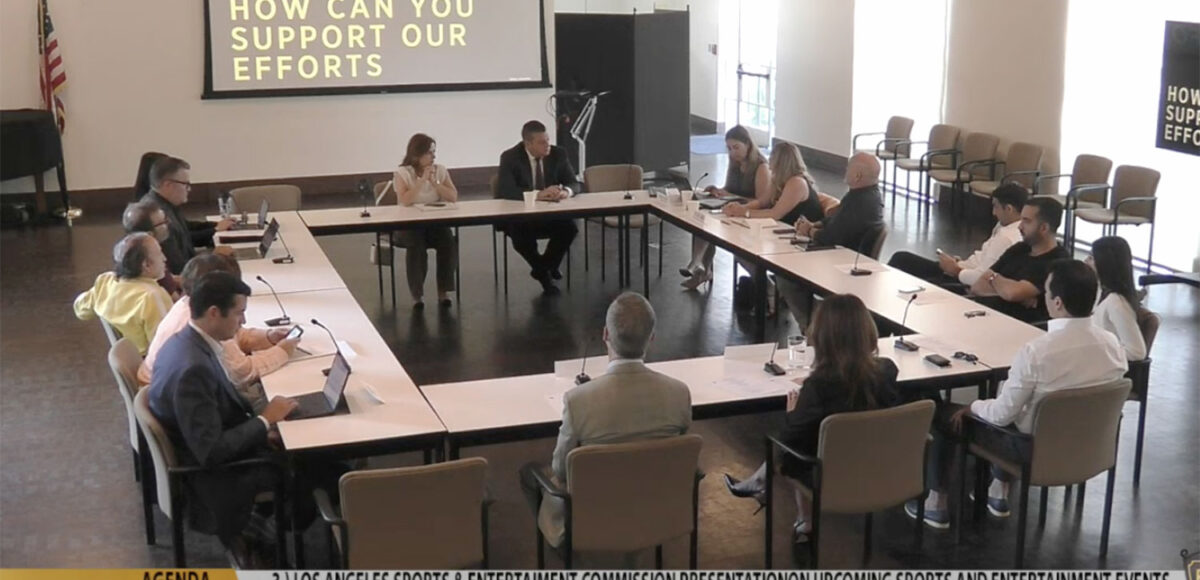On July 9, the Property Owners Task Force Committee Liaisons met with the Los Angeles Sports and Entertainment Commission (LASEC) to discuss a possible partnership with the city. In anticipation of a sizable lineup of sports events in Los Angeles County from now until 2028, LASEC President and CEO Kathryn Schloessman, who addressed the committee via Zoom, discussed the group’s plans to prepare local communities for upcoming events such as the FIFA World Cup in 2026 and the Superbowl in 2027. During the meeting, she urged the committee to partner with LASEC to provide inclined support.
In the summer of 2026, FIFA’s World Cup will bring 48 soccer teams from three countries and 16 cities around the world to LA. The event will consist of eight matches over five weeks and will be the biggest World Cup to date. As Schloessman explained, it will drive attention to local attractions, culture and dining and will be an important opportunity to highlight all that the region has to offer. “I think what people need to focus on is the before, during and after events,” she said. Aside from hotels, this also provides an economic opportunity for surrounding communities. She predicts that the total economic impact of this event will be upwards of $594 million.
Shortly after the World Cup, soccer, globally referred to as football, will be replaced by American football as LA prepares for the Superbowl. In 2027, SoFi Stadium will host the sporting event for the second time in five years. Fans from around the country will fly into the city, driving tourism and providing another opportunity for economic growth. According to Schloessman’s presentation, the event brought in $477 million in total economic impact in 2022. This was a result of not only the game, but also community engagement events before and after the Superbowl. “It’s really important that people understand that these events create tremendous community impact,” Schloessman said.
Through their Business Connect program, LASEC drives tourism towards diverse local businesses owned by women, minorities, veterans and members of the LGBTQ+ community. Through their Professional Development program, the commission provides opportunities to students who are interested in careers in the sporting events business. They also support LA communities through their legacy programs. “What’s different about these legacy programs is using the media visibility that we get around these international events— which is huge— to shine a light on the organizations that are already doing good work in our region,” said Schloessman. Lastly, she touched on sustainability and making sure that the event staff takes care of the communities around them. LASEC hosts cleanup days to lessen the environmental impact that these events leave behind. The commission is interested in partnering with Beverly Hills to promote these programs in the years leading up to the events and is asking the city for inclined support by providing security and other local efforts. “This has to be a group effort,” she explained. “One team, one mission.”
Later in the meeting, the Property Owners Task Force Committee discussed updates to retail queueing, especially in areas with heavy foot traffic such as Rodeo Drive. Retail queueing refers to the use of ropes and other blockers to distinguish where shoppers can line up on the sidewalks outside of retail businesses. The update outlined the proposed permitting process to be able to set up a queue outside of a store. In order to receive a permit, a business must submit a compliance form, encroachment agreement with the city and a certificate of insurance. Once issued, the permit is valid for one year and can be renewed. This would ensure that sidewalk obstructions are accounted for and regulated.
However, some members of the committee weren’t thrilled with the ability to set up a queue in front of a store. Some members of the audience complained about aesthetic effects, particularly on Rodeo Drive. City Councilmember Craig Corman suggested that instead of physical queueing, businesses should offer virtual queues to eliminate safety hazards on sidewalks. “When people are in queues they’re not shopping or going to other stores; they’re waiting in line” he said. “We [Corman and his fellow Councilmember John Mirisch] advocate the use of these new app based virtual queueing systems, where people can put their phone numbers in, and they get texts when their place in line comes up.” Some of the businesses on Rodeo Drive already utilize these apps, as he explained, which are free and require no permits. Additionally, the permits are not required if no ropes or barricades are used, so businesses are free to line customers in front of their stores without the use of equipment.
The City Council agreed to allow retail queueing on a permanent basis at a meeting on July 2, where they received support from the Rodeo Drive Committee. They are currently developing application forms and will notify businesses when they are required to comply.







